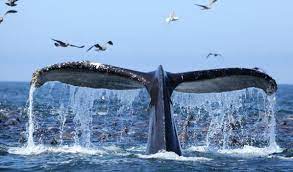From March 6 to 10, the Dominican Republic will host the Third World Humpback Whale Congress, in which scientists from several countries will present research and debate on the conservation of the cetacean, considered the best ambassador of the oceans.
At a press conference held at the Autonomous University of Santo Domingo (UASD), the organizers of the event indicated that the activity is certified by the United Nations Oceanic Decade program.
At the event, François Xavier Mayer, from Cetamada Madagascar, a non-profit organization that works for the conservation of marine mammals, said that having as much knowledge as possible about the humpback whale is essential when talking about its preservation.
essential when talking about its preservation.
“That is why we invite to this congress all the people who have knowledge on this subject,” he added, while indicating that there are multiple reasons why this mammal should be preserved and cited its key role in the fight against climate change by reducing carbon dioxide.
“It is also said that it is an umbrella species, because thanks to the whale other species can be protected, in addition to the fact that it allows us to understand see the health of the ocean,” he added.
A mammal that sustains regions
Mayer also pointed out that whales support many regions economically and cited the case of the province of Samaná, in this country, a very busy area during the whale watching season, which lasts until the end of March.
“The economic value given to the humpback whale is the best way to protect it. That is why scientists are accompanying us to determine how to frame tourism to ensure respect for the whales,” he said.
In this sense, he said that this fact also motivated that the central theme of this year’s Congress will be the blue economy. “You are, like us, friends of the whales and understand the importance they have for humanity,” he concluded.
Radhamés Silverio González, Vice Rector of Research and Postgraduate Studies of the UASD, said: “This congress represents a joint effort by the scientific community, civil society and the authorities to work for the conservation of humpback whales”.
The organizers of the event informed that the program will include the intervention of seven international guests, thematic oral sessions dedicated to migration, behavior, anatomy, genetics, acoustics and participatory science.
There will also be thematic workshops on the blue economy, port measures for the marine environment and the Caribbean regional project CAMAC, led by the AGOA Marine Mammal Sanctuary.
They further detailed that, as part of the event, delegates will also travel to Samaná to meet with tour operators and enjoy humpback whale watching.
The event is being held in collaboration with the Marine Biology Research Center of the Autonomous University of Santo Domingo (Cibima), the Dominican Foundation for Marine Studies (Fundemar), Atemar, the World Foundation for Democracy and Development, CeSigma Signals & Systems, Guadeloupe Port Caraïbes, the ITMX Group, the Marine Mammal Twinning, Moto Marina Tour and the Ocean Institute of the Sorbonne University.
Source: Elprofeshow.com
Learn more: NATURE
